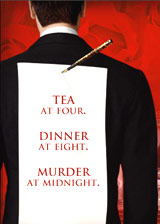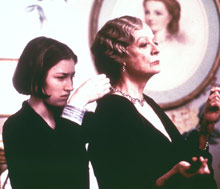| Gosford Park |
| |
 |
UK/USA/Germany, 2001. Rated R. 137 minutes.
Cast:
Eileen Atkins, Bob Balaban, Alan Bates, Claudie Blakely, Charles Dance,
Stephen Fry, Michael Gambon, Richard E. Grant, Tom Hollander, Derek Jacobi,
Kelly MacDonald, Hellen Mirren, Jeremy Northam, Clive Owen, Ryan Phillippe,
Camilla Rutherford, Maggie Smith, Geraldine Somerville, Kristin Scott
Thomas, Emily Watson, Natasha Wightman, James Wilby
Writers: Julian Fellows, based on an idea by Robert Altman and
Bob Balaban
Music: Patrick Doyle
Cinematographer: Andrew Dunn
Producers: Robert Altman, Bob Balaban, David Levy
Director: Robert Altman
LINKS
|
 ike
many Robert Altman movies (Short Cuts, The Player), Gosford Park
is, from the beginning, a bewildering array of characters and plotlines. Unlike
most other Altman movies, the bewilderment doesn't fully let up. Even at the
end, you may still be wondering how certain people are related to other people.
Only if you pay extremely close attention and speak British English as your
first language do you have a chance to follow everything. At the USA Films screening
I attended, I was handed an elaborate, illustrated chart of all the characters,
which has allowed me to piece together some things after the fact, but most
moviegoers will not have the benefit of such elucidatory materials.
ike
many Robert Altman movies (Short Cuts, The Player), Gosford Park
is, from the beginning, a bewildering array of characters and plotlines. Unlike
most other Altman movies, the bewilderment doesn't fully let up. Even at the
end, you may still be wondering how certain people are related to other people.
Only if you pay extremely close attention and speak British English as your
first language do you have a chance to follow everything. At the USA Films screening
I attended, I was handed an elaborate, illustrated chart of all the characters,
which has allowed me to piece together some things after the fact, but most
moviegoers will not have the benefit of such elucidatory materials.
The confusion is Gosford Park's only weakness. It is, however, a byproduct
of its strengths. Those strengths are realism and complexity. Altman has refused
to burden the film with any these-are-for-the-viewers'-benefit expository scenes,
preferring to enter the world of Gosford Park's British elite and their
servants mid-stream. Relationships and conflicts aren't explained; they are
hinted at in snide remarks and alluded to in quick asides, all of which you
must decipher for yourself. The sheer number of characters and conflicts is
frustrating, but the payoff makes up for it.
AboutFilm.Com
The Big Picture
|
| Alison |
-
|
| Carlo |
A-
|
| Claudia |
-
|
| Dana |
-
|
| Jeff |
A-
|
| ratings explained |
Set in 1932, Gosford Park concerns a large gathering for a hunting holiday
at the estate of Sir William McCordle (Michael Gambon) and his wife Lady Sylvia
McCordle (Kristin Scott Thomas), and the murder that eventually takes place.
(Colonel Mustard with a dagger in the library!) That's all you need to know
about the plot. Gosford Park is a mystery in name only. It's really an
examination of Britain's ancient class system, which by 1932 was tottering and
about to be swept aside by the disintegration of the British Empire (already
underway), World War II, and the marginalization of Britain as a world power.
(Professor Plum with a revolver in the study!)
Realizing this on some subconscious level, the characters--even the servants--cling
to class divisions and roles pathetically, because it is the only world they
know and the only one that gives their lives any meaning--note how the servants
respond when one person attempts to cross class divisions. The Lords and Ladies
"above stairs" are almost infantile in their inability to care for themselves
and with their petty squabbles and lingering grudges, while "below stairs,"
the servants are only able to bask in the reflected glory of their employers,
what little is left of it, and replicate their employers' pecking order. The
characters know that their world is coming to an end on some subconscious level--their
rigid behavior is almost pitiful. Gosford Park is Clue! meets
Remains of the Day. (Mrs. Peacock with a rope in the kitchen!)
Within the elite there is a second division, one between the new money and
the old money. By 1932, "old money" had become an oxymoron, and the latter group
had grown dependent on the former group (as evidenced by old-money Lady Sylvia's
marriage to new-money Sir William), though unwilling to forget new money's common
origins (as evidenced by Lady Sylvia's lack of respect for her husband). Their
lives are a big soap opera, everyone scheming about marriages and money.  Gosford
Park isn't about how the power games are played, though, but about how inept
the players are and meaningless the games have become (unlike in, say, Howards
End). (Miss Scarlett with a spanner in the ballroom!)
Gosford
Park isn't about how the power games are played, though, but about how inept
the players are and meaningless the games have become (unlike in, say, Howards
End). (Miss Scarlett with a spanner in the ballroom!)
The new world intrudes unavoidably in the form of Bob Balaban's American movie
producer Morris Weissman and Jeremy Northam's matinee idol Ivor Novello. (Balaban
is also co-producer and co-originator, with Altman, of the idea for Gosford
Park.) They aren't just new money like Sir William (who got his from an
empire of sweatshops), they are modern money, built on providing entertainment
to the masses in the form of movies that the elite never see, as Maggie Smith's
Countess so cuttingly remarks in one scene after Weissman refuses to divulge
the ending of a movie he wants to make. The fact that Weissman and Novello are
the future is obvious in the servant's attitude toward them--despite pretense
to the contrary, they all clearly find Novello to be the most glamorous of the
bunch. The memorable sequence in which they all gather surreptitiously behind
curtains and doorways to listen to him sing at the piano is artfully choreographed.
(Reverend Green with a candlestick in the dining room!)
The servants themselves are practically invisible to their employers, even
though they permeate their world. The servants are everywhere and see everything--the
entire movie is told from their perspective. Not one scene is shown that a servant
doesn't observe at least in part. Yet Stephen Fry's inept, anxious-to-please
police inspector refuses even to consider the possibility that one of the servants
could be the murderer, because the servants cannot possibly have any personal
connection to the victim--a comment that by that time is humorously belied by
at least two secretive inter-class romantic entanglements. Of course, it is
unforgivable to acknowledge such things. (Mrs. White with a lead pipe in the
conservatory!)
The large cast, which contains numerous stars and veteran character actors,
delivers what is undoubtedly the best ensemble performance of the year. Maggie
Smith is known for her acerbic roles, but the Countess is the queen of all acerbic
roles, and the source of most of the film's one-liners. Ryan Phillipe seems
a bit off--that's the only way to put it--as he so often does, and the magnetic
Clive Owens is anomalous as the one servant who doesn't blend easily into the
background. Jeremy Northam is the only person who exudes amiability and charm,
Emily Watson is a memorably stressed-out chain-smoking head housemaid, and Helen
Mirren (the housekeeper) gets a big scene that is earning her consideration
as Best Supporting Actress in the various critics' awards. These actors do not
deliver noticeably stronger performances than the others; it's just that their
characters' traits are more noticeable. If there is a protagonist, it is Kelly
MacDonald, whom you may remember was prominently featured in the Trainspotting
poster and also appeared briefly in the film itself (as Ewan McGregor's underage
love interest). Here she plays the Countess's inexperienced Scottish servant
through whose eyes much of the story is told. (Lady uh, …Brown…in the, uh…stables…with
an, uh…extremely large chainsaw!)
There is no doubt that some will find Gosford Park to be an inert snore,
and you probably know yourself well enough to know if you are one of those people.
Don't go to Gosford Park if you like mystery/thrillers. Instead, go to
Gosford Park if you like character examinations and historical snapshots,
because that's what it is, and an absorbing, expertly rendered one at that.
You'll get your answer to whodunit at the end, but the answer is more interesting
for what it says about the society Altman depicts than for the mystery it solves.
Review
© December 2001 by AboutFilm.Com and the author.
Images © 2001 USA Films. All Rights Reserved.

 Gosford
Park isn't about how the power games are played, though, but about how inept
the players are and meaningless the games have become (unlike in, say, Howards
End). (Miss Scarlett with a spanner in the ballroom!)
Gosford
Park isn't about how the power games are played, though, but about how inept
the players are and meaningless the games have become (unlike in, say, Howards
End). (Miss Scarlett with a spanner in the ballroom!)
